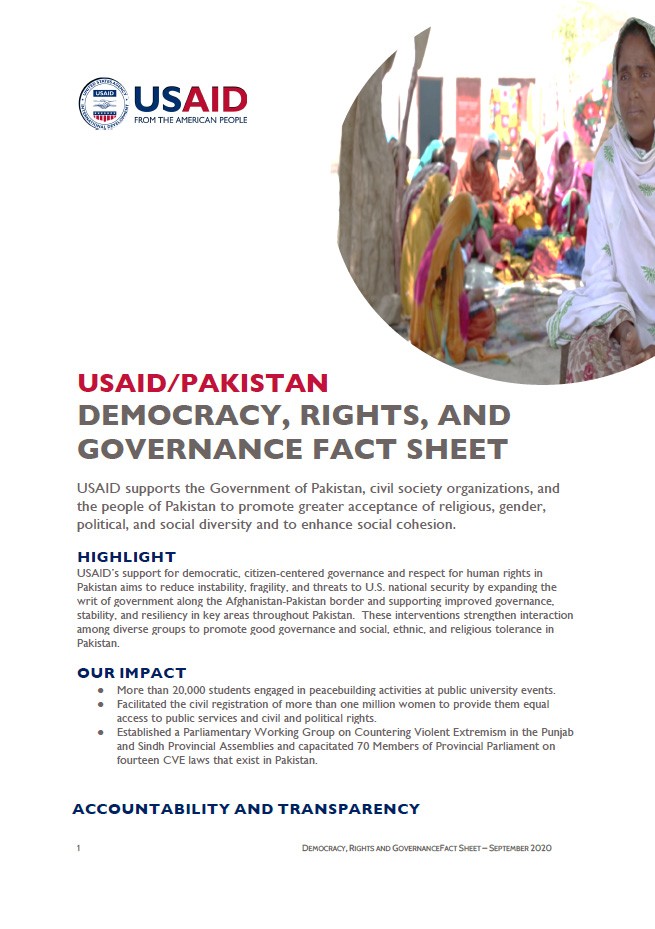Speeches Shim
The United States Agency for International Development (USAID) supports the Government of Pakistan, civil society organizations (CSOs), and the people of Pakistan to promote greater acceptance of religious, gender, political, and social diversity and to enhance social cohesion.
HIGHLIGHT
USAID’s support for democratic, citizen-centered governance and respect for human rights in Pakistan aims to reduce instability and threats to national security by helping Pakistan expand the writ of government along the Afghanistan-Pakistan border and improve governance, stability, and resiliency in key areas of Pakistan. These interventions strengthen interaction among diverse groups to promote good governance and social, ethnic, and religious tolerance in Pakistan.
OUR IMPACT
- More than 20,000 students engaged in peacebuilding activities at public university events.
- Facilitated the civil registration of more than one million women to provide them equal access to public services and civil and political rights.
- Supported the establishment of a Parliamentary Working Group on Countering Violent Extremism (CVE) in the Punjab and Sindh Provincial Assemblies and capacitated 70 Members of Provincial Parliament on fourteen CVE laws that exist in Pakistan.
ACCOUNTABILITY AND TRANSPARENCY
In partnership with government counterparts, USAID supports transparency of public institutions and constructive citizen participation in public policy. The aim is to build trust in public institutions, which will serve as a barrier to violent extremism. For example, USAID supported five universities in Sindh and Punjab to incorporate courses developed by leading CVE experts on tolerance and civic and social responsibility.
GOVERNANCE AND CIVIL SOCIETY
USAID’s activities strengthen citizens’ voices to constructively articulate their needs to the government, responsibly participate in political and peacemaking processes, and engage local leaders and communities in efforts to improve peace and stability. For example, USAID reached more than 900,000 people with peace and tolerance messaging through digital media platforms. Activities help civil society organizations build institutional capacity so that they can be more effective vehicles for aggregating or catalyzing citizen opinion and to advocate for improved services, legal reforms, and government oversight.
DEMOCRATIC ELECTIONS AND INSTITUTIONS
Free and transparent elections facilitate social and political integration and are critical to maintaining peace and security in Pakistan. USAID is developing the capacity of local institutions, improving citizen-led election observation and oversight, supporting policies on transparent record keeping and access to election results, and highlighting the inclusion of women in elections and political processes. Our programs also support the national voter registration process for women and youth.
WOMEN’S ECONOMIC AND SOCIAL EMPOWERMENT
USAID partners with government, private sector businesses, and CSO alliances to improve women’s livelihoods by supporting social protection, market development, and addressing socio-cultural barriers that women face in various economic and social contexts. Our interventions aim to empower women by promoting and protecting their socio-economic rights and political participation in conflict-affected, hard-to-reach areas of Khyber Pakhtunkhwa.
PEACE BUILDING, SOCIAL TOLERANCE, AND HUMAN RIGHTS
USAID supports community projects that reinforce and affirm the basic human rights of women and minority groups, and promote social cohesion by expanding acceptance of religious, social, and political diversity. For example, USAID engaged more than 35,000 students in positive activities ranging from arts, culture, music, sports and critical thinking through forming, reactivating and capacitating 86 student societies in 13 universities in Sindh and Punjab. Additionally, USAID aims to enhance the Government of Pakistan’s capacity to develop and promote policies to prevent and resolve violent conflicts.



Comment
Make a general inquiry or suggest an improvement.